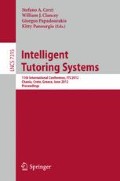Abstract
Experiences of confusion have been found to correlate with learning, particularly for learning at deeper levels of comprehension. Previously, we have induced confusion within learning environments that teach critical scientific reasoning. Confusion was successfully induced with the presentation of contradictory information and false feedback. Next, we would like to regulate experiences of confusion to increase learning. In the current paper, we propose a series of experiments that investigate potential interventions to help regulate confusion during learning. Specifically, these experiments will address the impact of feedback specificity and emotional support.
Access this chapter
Tax calculation will be finalised at checkout
Purchases are for personal use only
References
Calvo, R., D’Mello, S. (eds.): New Perspectives on affect and learning technologies. Springer, New York (2011)
VanLehn, K., Siler, S., Murray, C., Yamauchi, T., Baggett, W.: Why do only some events cause learning during human tutoring? Cognition and Instruction 21(3), 209–249 (2003)
Lehman, B., D’Mello, S.K., Strain, A.C., Gross, M., Dobbins, A., Wallace, P., Millis, K., Graesser, A.C.: Inducing and Tracking Confusion with Contradictions during Critical Thinking and Scientific Reasoning. In: Biswas, G., Bull, S., Kay, J., Mitrovic, A. (eds.) AIED 2011. LNCS, vol. 6738, pp. 171–178. Springer, Heidelberg (2011)
D’Mello, S., Graesser, A.: Inducing and tracking confusion and cognitive disequilibrium with breakdown scenarios. Memory and Cognition (in review)
Lehman, B., Mills, C., D’Mello, S., Graesser, A.: Automatic Evaluation of Learner Self-Explanations and Types of Erroneous Responses for Dialogue-Based ITSs. In: Cerri, S.A., Clancey, B. (eds.) ITS 2012. LNCS, vol. 7315, pp. 544–553. Springer, Heidelberg (2012)
Fedor, D.: Recipient Responses to Performance Feedback: A Proposed Model and its Implications. Research in Personnel and Human Resources Management 9, 73–120
Dweck, C.: The development of ability conceptions. In: Wigfield, A., Eccles, J. (eds.) Development of Achievement Motivation, pp. 57–88. Academic Press, San Diego (2002)
Author information
Authors and Affiliations
Editor information
Editors and Affiliations
Rights and permissions
Copyright information
© 2012 Springer-Verlag Berlin Heidelberg
About this paper
Cite this paper
Lehman, B., D’Mello, S., Graesser, A. (2012). Interventions to Regulate Confusion during Learning. In: Cerri, S.A., Clancey, W.J., Papadourakis, G., Panourgia, K. (eds) Intelligent Tutoring Systems. ITS 2012. Lecture Notes in Computer Science, vol 7315. Springer, Berlin, Heidelberg. https://doi.org/10.1007/978-3-642-30950-2_75
Download citation
DOI: https://doi.org/10.1007/978-3-642-30950-2_75
Publisher Name: Springer, Berlin, Heidelberg
Print ISBN: 978-3-642-30949-6
Online ISBN: 978-3-642-30950-2
eBook Packages: Computer ScienceComputer Science (R0)

